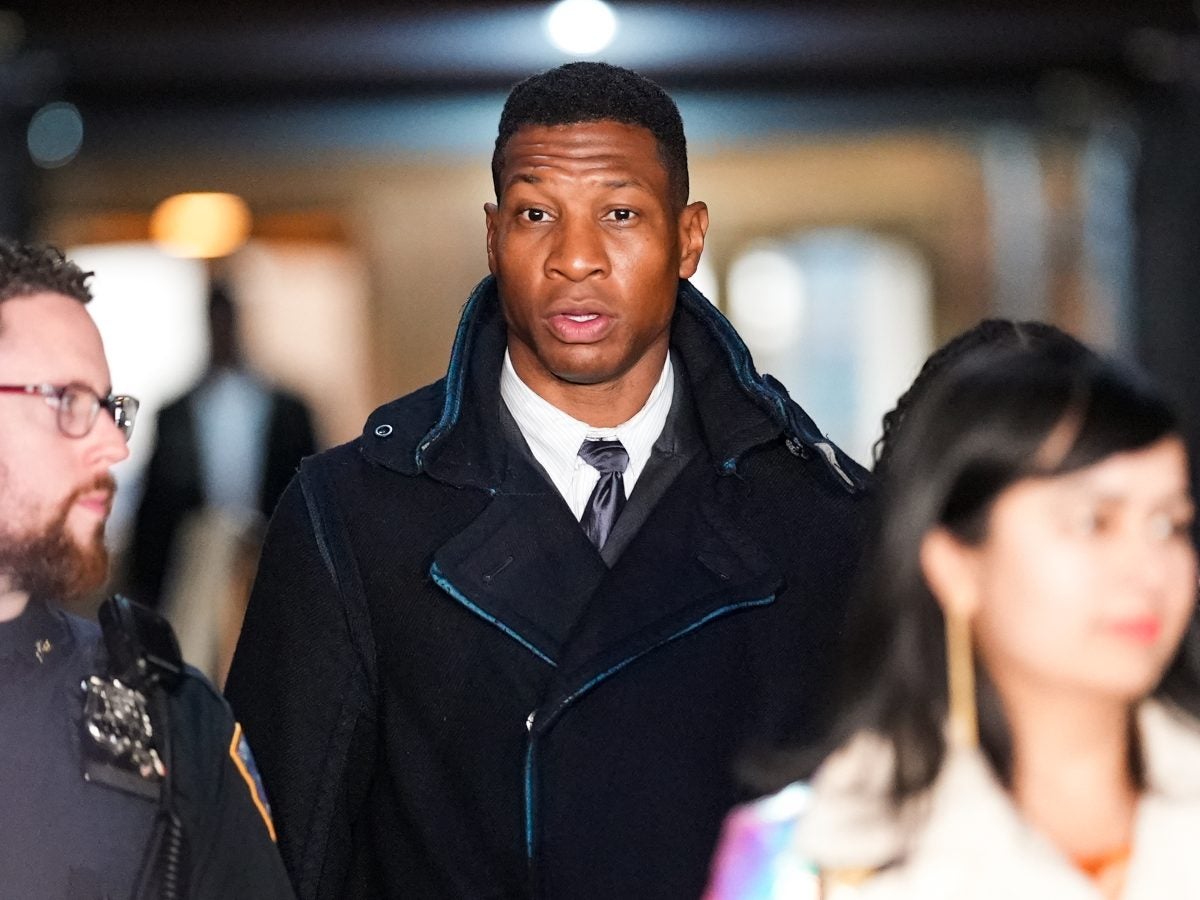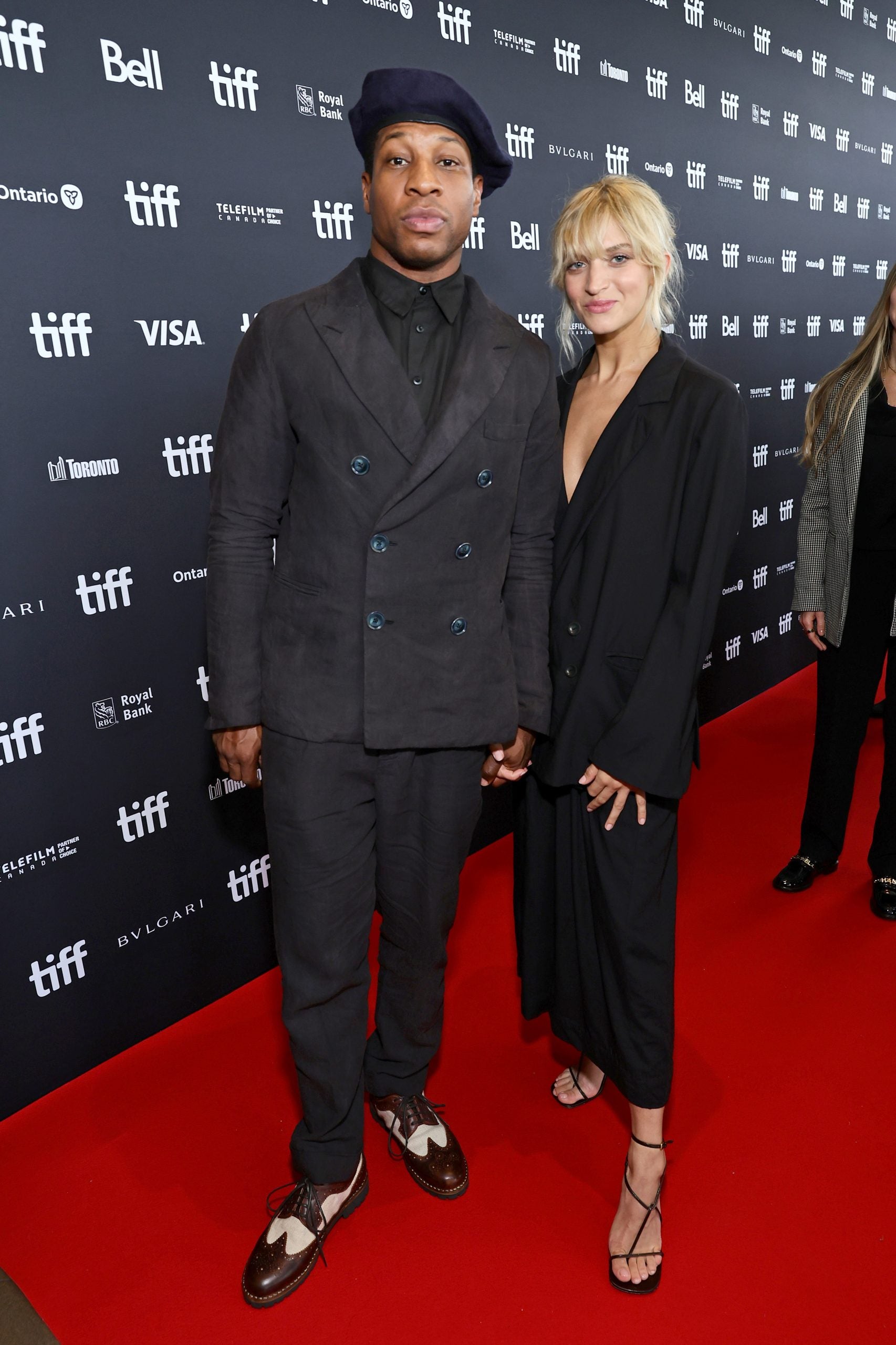
To the surprise of many, Jonathan Majors went from a fast rising actor in Hollywood to a blacklisted one within a span of months this year. On March 25, Majors’ former girlfriend, Grace Jabbari, accused him of domestic violence, claiming he attacked her and fractured her finger during a dispute. Fast forward to December 18, and Majors was found guilty of two misdemeanors by a New York jury, which include one count of assault in the third degree and one count of harassment. Majors was dropped from Marvel Studios and lost his coveted role as character Kang the Conqueror shortly after being found guilty. He has also been dropped by his management company, public relations firm and several advertisers since his arrest. A film he recently starred in that was generating early Oscar buzz, Magazine Dreams, has been shelved. The Creed III actor will be sentenced on February 6 and potentially faces a year in prison.
Following the verdict, the Manhattan District Attorney’s Office released a statement post verdict saying the evidence showed a “cycle of psychological and emotional abuse, and escalating patterns of coercion” by Majors.
Despite text and audio evidence that came forth of Majors being what appeared to be mentally and emotionally abusive, blog comment sections have been in a frenzy. Many disagreed with the verdict and believe it’s blatant racism. But the evidence consisted of transcripts of the actor cautioning Jabbari against going to the hospital after sustaining a head injury because it could “lead to an investigation,” him threatening to kill himself, and audio where he asked his former girlfriend to “act more like Coretta Scott King and Michelle Obama” and represent him better.
It’s interesting how many people skirt right over this evidence and staunchly hold the position that this is another example of being Black in America. They say Majors was being chased down the block by a white woman (there was video footage of this happening the night of the altercation in question), so how on earth could he be the guilty one? They say if Jabarri was really being abused, why would she be chasing him? They mention horror stories like Emmett Till and caution other Black men with the “I told you to stop messing with white women” rhetoric. It’s concerning to see these comments for multiple reasons.

One reason, which always saddens me, is because they showcase how much people minimize verbal and emotional abuse. We also have a cookie cutter view about how people should respond to that abuse. Reading their text messages and seeing the transcripts of the audio was terribly triggering for me. The words were familiar, forcing me to look at the yet-to-be-fully-healed scars of my own.
Emotional abuse is defined as “behavior in any relationship that is used by one partner to gain or maintain power and control over another intimate partner,” according to the Office on Violence Against Women. Based on this definition, the behavior exhibited by Majors fits the bill. Guilt-tripping an injured partner into not getting treatment and threatening them with suicide fits the definition. So why then are people not talking about this abuse and how the verdict matches those offenses? Because they don’t see emotional abuse as harmful in the way they see the physical kind and because Jabbari is white.
Starting with addressing emotional and mental abuse–no it’s not less impactful than physical abuse. According to a study by the National Library of Medicine, respondents who reported emotional abuse had higher scores for depression, anxiety, stress and neuroticism than people who only reported physical, sexual, or both physical and sexual abuse. While it was entertaining for some to hear Majors tell Jabarri to be more like our Black heroes, it was abusive. I remember repeatedly being told by an abusive ex that I should be more like one woman or another, that he could be with a light-skinned woman but he chose to be with me, and that I didn’t know how to be a woman. I still remember how much that gradually crushed my self-esteem. And just because it took me over two years to leave, it doesn’t mean I wasn’t being abused. I also recall having a boyfriend at 19 who threatened to kill himself every time I wanted to end things. The end of that relationship triggered the beginning of undiagnosed depression and suicidal thoughts for me. Both situations weren’t harmless or humorous and had ripple effects.
As for people ignoring Majors’ abuse because Jabbari is white, that is counterproductive to the progress we’re trying to make when it comes to violence against women, period. I’m not denying that white women have historically abused their privilege. Black men have indeed been repeatedly convicted and killed because white tears have been seen as more respectable than the truth. But I don’t think that’s the case here. And we can hold space for two truths simultaneously: Some white women abuse their power and wrongfully accuse Black men, and some Black men also need to do better.
Because I love Black men I think it’s important to hold them accountable, even when it involves a white woman. I especially think women of color should tread carefully when parroting rhetoric like, “That’s why you should stick with Black women,” because him being with a Black woman wouldn’t have made him less abusive. This messaging is also dangerous because it alludes that Black women have a higher tolerance for abuse and maybe wouldn’t have called the police or “threw him under the bus.”
We are not safe havens for abusive Black men who can’t find the courage to confront their trauma and heal. We already face some of the highest rates of domestic violence, as African-American women experience intimate partner violence at a rate 35% higher than their white counterparts. We aren’t welcoming any more of that. Also, correct me if I’m wrong, but I thought we were also done trying to heal men who don’t want to engage in the work of healing themselves. As I write this, I also raise an eyebrow at actress Meagan Good, Majors’ girlfriend. To publicly stand behind a man accused of domestic violence during the incipient stages of your relationship is questionable. That said, if our goal as Black women is to unwrite this narrative about us as safe havens for and sometimes enablers of trauma-ridden men, then this blind loyalty ain’t it.
Majors may be an incredible actor but that doesn’t mean he wasn’t also an abusive boyfriend. It doesn’t give him a hall pass if he was abusive be it physically, mentally, emotionally or all three. The better we get at calling our men out when they’re wrong and holding them accountable for healing their dysfunction, the closer we can get to seeing real healing and progress for our community.